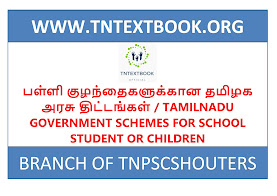TAMIL
- 1982ஆம் ஆண்டில் சத்தான உணவுத் திட்டத்தை அறிமுகப்படுத்திய முன்னோடி மாநிலமாக தமிழ்நாடு திகழ்கிறது. மாணவர்களின் சேர்க்கையை அதிகரிக்கவும், பள்ளிகளில் வருகையை தக்கவைக்கவும், அதே நேரத்தில் குழந்தைகளின் ஊட்டச்சத்து அளவை மேம்படுத்தவும் நோக்கம் கொண்டது இத்திட்டம்.
- பசி அல்லது நோய்வாய்ப்பட்ட குழந்தையால் முழு கவனத்துடன் படிப்பில் கவனம் செலுத்த முடியாது. இதன் காரணமாக, அரசு, அரசு உதவி பெறும் பள்ளிகள், சிறப்புப் பயிற்சி மையங்கள், மதராசாக்கள் மற்றும் சர்வ சிக்ஷா அபியான் கீழ் ஆதரிக்கப்படும் பத்தாம் வகுப்பு வரையிலான தொடக்க மற்றும் மேல்நிலை வகுப்புகளில் பயிலும் குழந்தைகளுக்கு இலவச சூடான சமைத்த மதிய உணவு வழங்கப்படுகிறது.
- தொடக்கக் கல்வியை உலகளாவிய மயமாக்கும் நோக்கில் மாணவர் சேர்க்கையை அதிகரிக்கவும், பள்ளி இடைநிற்றலைக் குறைக்கவும் நோக்கமாகக் கொண்டது இத்திட்டம்.
- குறைந்த உணவு மற்றும் ஊட்டச்சத்து இல்லாத குழந்தைகளுக்கு ஊட்டச்சத்தை வழங்குதல்.
- பின்தங்கிய பின்னணியில் உள்ள குழந்தைகளை தவறாமல் பள்ளிக்குச் செல்ல ஊக்குவிப்பது மற்றும் முறையான கல்வியைப் பெற அவர்களுக்கு உதவுதல்.
- வேலை வாய்ப்புகளை வழங்குவதன் மூலம் பெண்களுக்கு அதிகாரம் அளிப்பது.
- 5-9 வயதுக்குட்பட்ட தொடக்கப் பள்ளிக் குழந்தைகளுக்கும், 10-15 வயதுக்குட்பட்ட மேல்நிலைப் பள்ளிக் குழந்தைகளுக்கும், வாரத்தில் ஐந்து நாட்களுக்கு, பள்ளி வளாகத்திலேயே சூடான சமைத்த சத்தான உணவுகள் வழங்கப்படுகின்றன. ஒரு வருடத்தில் 220 நாட்கள்.
- காஞ்சிபுரம், வேலூர், திருவண்ணாமலை, நாமக்கல், தருமபுரி, கிருஷ்ணகிரி, சேலம், கோவை, ஈரோடு, திருப்பூர், திருச்சிராப்பள்ளி, திண்டுக்கல், விருதுநகர், திருநெல்வேலி, தூத்துக்குடி மற்றும் சென்னை ஆகிய 16 மாவட்டங்களில் உள்ள தேசிய குழந்தைத் தொழிலாளர் திட்ட சிறப்புப் பள்ளிகளில் சேர்க்கப்பட்டுள்ள குழந்தைகள் ஒரு வருடத்தில் 312 நாட்களுக்கு சூடான சமைத்த சத்தான பல்வேறு உணவுகளும் வழங்கப்படுகின்றன.
- ஆரம்பக் குழந்தைகளுக்கு (1வது வகுப்பு முதல் 5ம் வகுப்பு வரை) ஒரு பள்ளி நாளுக்கு ஒரு குழந்தைக்கு உணவு தானியங்கள் (அரிசி) @ 100 கிராம் மற்றும் மேல்நிலைப் பள்ளிகளுக்கு (6வது வகுப்பு முதல் 10வது வகுப்பு வரை) @ 150 கிராம் வழங்கப்படுகிறது.
- அனைத்து 5 வேலை நாட்களிலும் 1 ஆம் வகுப்பு முதல் 10 ஆம் வகுப்பு வரை உள்ள அனைத்து குழந்தைகளுக்கும் முட்டை வழங்கப்படுகிறது.
- முட்டை சாப்பிடாத குழந்தைகளுக்கு 100 கிராம் எடையுள்ள வாழைப்பழம்
- 20 கிராம் கருப்பட்டி / பச்சைப்பயறு போன்றவை இன்றைய புரதம், வைட்டமின்கள் மற்றும் கலோரி தேவைகளை கருத்தில் கொண்டு குழந்தைகளுக்கு வழங்கப்படுகிறது.
- அனைத்து வெள்ளிக்கிழமைகளிலும் 20 கிராம் வேகவைத்த உருளைக்கிழங்கு
- குழந்தைகளிடையே அயோடின் மற்றும் இரும்புச் சத்து குறைபாட்டை நிவர்த்தி செய்வதற்கும், சுகாதார தலையீடு திட்டத்தின் ஒரு பகுதியாகவும், இரட்டை செறிவூட்டப்பட்ட உப்பு சமையலுக்குப் பயன்படுத்தப்படுகிறது. இது குழந்தைகளின் அயோடின் குறைபாட்டைத் தடுக்கிறது.
- முக்கியமான சந்தர்ப்பங்களில், வெல்லம் மற்றும் நெய்யைப் பயன்படுத்தி குழந்தைகளுக்கு இனிப்புப் பொங்கல் பரிமாறப்படுகிறது.
- Tamil Nadu was the pioneer state to introduce the Nutritious Food Program in 1982. The scheme aims to increase student enrolment, sustain attendance in schools and at the same time improve children's nutritional levels.
- A hungry or sick child cannot concentrate on studies with full attention. Due to this, free hot cooked midday is provided to children studying in government, government aided schools, special training centres, madrasas and primary and secondary classes up to class 10 supported under Sarva Siksha Abhiyan.
- The program aims to increase enrollment and reduce school dropout rates towards universalization of primary education.
- Providing nutrition to undernourished and malnourished children.
- Encouraging children from underprivileged backgrounds to attend school regularly and help them acquire proper education.
- Empowering women by providing employment opportunities.
- Primary school children aged 5-9 years and secondary school children aged 10-15 years are served hot cooked nutritious meals on the school premises five days a week. 220 days in a year.
- Children enrolled in National Child Labor Program Special Schools in 16 districts of Kanchipuram, Vellore, Thiruvannamalai, Namakkal, Dharmapuri, Krishnagiri, Salem, Coimbatore, Erode, Tirupur, Tiruchirappalli, Dindigul, Virudhunagar, Tirunelveli, Thoothukudi and Chennai receive hot cooked meals for 312 days in a year. A variety of food is also served.
- Food grains (rice) @ 100 gm per child per school day for primary school children (Class 1 to 5) and for secondary schools (Class 6 to 10) @ 150 g.
- Eggs are provided to all children from class 1 to class 10 on all 5 working days.
- 100 grams of banana for children who do not eat eggs
- 20 grams of black gram / green gram is given to children considering today's protein, vitamins and calorie requirements.
- 20 grams of boiled potatoes on all Fridays
- Doubly concentrated salt is used in cooking to address iodine and iron deficiency among children and as part of a health intervention program. It prevents iodine deficiency in children.
- On important occasions, sweet pongal is served to children using jaggery and ghee.









0 Comments